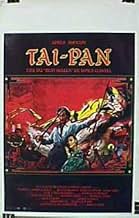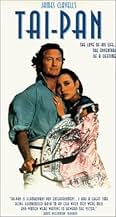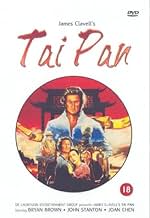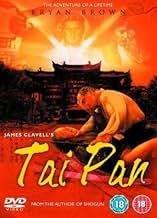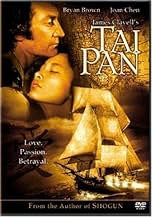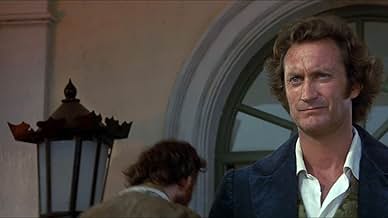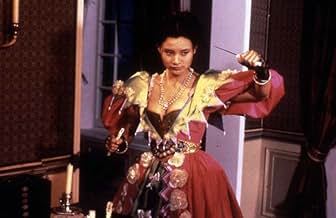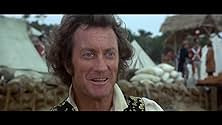IMDb रेटिंग
5.6/10
2.1 हज़ार
आपकी रेटिंग
अपनी भाषा में प्लॉट जोड़ेंHistorical fiction set against the backdrop of Hong Kong in its early years of British rule.Historical fiction set against the backdrop of Hong Kong in its early years of British rule.Historical fiction set against the backdrop of Hong Kong in its early years of British rule.
- पुरस्कार
- 2 कुल नामांकन
फ़ीचर्ड समीक्षाएं
I found this movie to follow the novel pretty closely, considering of course that the novel is about 900 pages and the movie is only two hours! While not of the same outstanding caliber of adaptation as the Shogun miniseries, it nevertheless manages to generate some excitement and give a flavor for the happenings of that period, during which the colony of Hong Kong was founded.
Joan Chen was especially good as Mai-Mai, and all the other parts were at least adequately cast. The locations, sets and production values were of uniformly good quality. The only thing lacking was enough time to tell a story this long and complex--in such a short production one only has time to hit the high points of the plot. But it was enjoyable nevertheless.
Joan Chen was especially good as Mai-Mai, and all the other parts were at least adequately cast. The locations, sets and production values were of uniformly good quality. The only thing lacking was enough time to tell a story this long and complex--in such a short production one only has time to hit the high points of the plot. But it was enjoyable nevertheless.
As a movie reviewer for my college newspaper, I often was told: "You've got a great job, you get paid to go to movies." My standard answer was: "It's not that great - I had to sit through 'Tai-Pan'." The only movie that has given me more pain was "Ishtar."
Tai-Pan was probably too ambitious an undertaking for a film as short as just over 2 hours. Maybe a mini-series would have been the answer, but Tai-Pan certainly had the potential to be an oriental Gone With The Wind.
Unrealized potential though it is. The screenplay made many references to previous events in the novel that are not shown here. We do know there's one nasty rivalry going on between Bryan Brown and John Stanton who both rose to wealth in the China trade like the protagonists in an Edna Ferber novel.
Bryan Brown is the Far East version of Rhett Butler. He's built the family fortune on legal trade and illegal trade in opium. Not that opium was unknown before the British and other European powers got there, but they did turn it into a thriving business. When the Chinese government objected, the European powers took nibbles out of a prostrate and weakened state.
One of those nibbles the British took was Hong Kong, spoils from the Opium War of 1841. Brown like Margaret Mitchell's Rhett Butler or the hero of many Edna Ferber books is the guy who builds what became one of the busiest trading centers on the globe.
Unlike his rival Stanton, Brown's wife left him and took their small son back to the United Kingdom. Brown didn't mourn he took up with some Chinese women, they were pawns in various business negotiations. He got a son, Russell Wong, from one of them.
Things get interesting when his other son arrives from Great Britain played by Tim Guinee. He's a rather uptight Victorian youth who is not pleased with the debauchery he finds and his father's part in it.
Tai-Pan is exquisitely photographed with the climatic typhoon scene very well done indeed. A better screenplay would have been needed to tell this epic story.
Unrealized potential though it is. The screenplay made many references to previous events in the novel that are not shown here. We do know there's one nasty rivalry going on between Bryan Brown and John Stanton who both rose to wealth in the China trade like the protagonists in an Edna Ferber novel.
Bryan Brown is the Far East version of Rhett Butler. He's built the family fortune on legal trade and illegal trade in opium. Not that opium was unknown before the British and other European powers got there, but they did turn it into a thriving business. When the Chinese government objected, the European powers took nibbles out of a prostrate and weakened state.
One of those nibbles the British took was Hong Kong, spoils from the Opium War of 1841. Brown like Margaret Mitchell's Rhett Butler or the hero of many Edna Ferber books is the guy who builds what became one of the busiest trading centers on the globe.
Unlike his rival Stanton, Brown's wife left him and took their small son back to the United Kingdom. Brown didn't mourn he took up with some Chinese women, they were pawns in various business negotiations. He got a son, Russell Wong, from one of them.
Things get interesting when his other son arrives from Great Britain played by Tim Guinee. He's a rather uptight Victorian youth who is not pleased with the debauchery he finds and his father's part in it.
Tai-Pan is exquisitely photographed with the climatic typhoon scene very well done indeed. A better screenplay would have been needed to tell this epic story.
It's worth pointing out that I came to this film having read James Clavell's excellent novel, TAI-PAN, on which this is based. If I hadn't read the book beforehand, I probably would have enjoyed this adaptation a lot more.
Sadly, I was left feeling that the filmed TAI-PAN is a crushing disappointment, purely because it cuts so very much out of the story. The whole background is missing, the Triad stuff, the politics, the trade with the Chinese. The story is reduced to the human relationships and particularly the family rivalries between the main characters, but there was so much more to it than that.
I do understand that films are very different to books and that adaptations have to cut material out, but TAI-PAN has a two hour running time and a lot of it is slow-paced. If it had told events at a much faster pace, it would have been able to include a lot more of the details and subtleties that are missing here. As it is, there are elements of greatness - plus the novelty of seeing Bryan Brown in a leading role - but it could have been so much more. A miniseries would suffice better, I think.
Sadly, I was left feeling that the filmed TAI-PAN is a crushing disappointment, purely because it cuts so very much out of the story. The whole background is missing, the Triad stuff, the politics, the trade with the Chinese. The story is reduced to the human relationships and particularly the family rivalries between the main characters, but there was so much more to it than that.
I do understand that films are very different to books and that adaptations have to cut material out, but TAI-PAN has a two hour running time and a lot of it is slow-paced. If it had told events at a much faster pace, it would have been able to include a lot more of the details and subtleties that are missing here. As it is, there are elements of greatness - plus the novelty of seeing Bryan Brown in a leading role - but it could have been so much more. A miniseries would suffice better, I think.
As another reviewer put it, this movie was very similar to Dune. Very interesting comparison, since Raffaella De Laurentiis produced them both. This was her first project right after Dune. Both were sweeping epic sagas with multiple intertwined plotlines. Both should have been six or eight hour mini series and not feature films. As with Dune, you will find that if you have not read the book, you will not understand the movie. However, if you have read the book, then the movie isn't all that bad. James Clavell's 'Asian Saga' is one of my favorite book series, so I bought this movie cheap just to see it. The characters are like old friends to me, so I didn't think that the movie was all that bad. I realized while watching it though, that someone who had not read the book would not be able to keep up with all of the plot points. My suggestion to you is to read the book, then watch the movie. You will discover two things; first it's a super good book. Second, this movie had everything going for it in cast and settings; it just had too much story to tell in too short a time. It definitely should have been a six-hour miniseries.
क्या आपको पता है
- ट्रिवियाProducer Martin Ransohoff and the Metro-Goldwyn-Mayer studio in 1966 acquired the rights to James Clavell's source "Tai-Pan" novel for US $500,000. The movie was then announced by MGM in 1967-68 to star Patrick McGoohan to play Dirk Struan, to be directed by Michael Anderson, with source novelist Clavell writing the screenplay. The picture was originally budgeted to cost US $26 million which was then reduced to US $20 million. The project sat around stagnant for a time in development hell. However, after severe operating losses, the epic was one of a number of expensive projects the new management at the MGM studio dropped as being too costly. The project and the development of the movie at MGM was in the end canceled by executive James T. Aubrey.
- गूफ़In a scene, set in 1841, several of the ladies were wearing bright mauve outfits. That would have been most unlikely for the wives of middle class traders at that time as the color purple was prohibitively expensive before the invention of analine dyes in London - in 1856. By 1870 these gaudy colors had become so cheap and commonplace that it became a status symbol to mimic the subtler, paler colors of the pre analine dye days.
- भाव
Dirk Struan: No emperor has seen the guns of a British man-of-war.
टॉप पसंद
रेटिंग देने के लिए साइन-इन करें और वैयक्तिकृत सुझावों के लिए वॉचलिस्ट करें
- How long is Tai-Pan?Alexa द्वारा संचालित
विवरण
बॉक्स ऑफ़िस
- बजट
- $2,50,00,000(अनुमानित)
- US और कनाडा में सकल
- $40,07,250
- US और कनाडा में पहले सप्ताह में कुल कमाई
- $18,63,469
- 9 नव॰ 1986
- दुनिया भर में सकल
- $40,07,250
- चलने की अवधि2 घंटे 7 मिनट
- ध्वनि मिश्रण
- पक्ष अनुपात
- 2.35 : 1
इस पेज में योगदान दें
किसी बदलाव का सुझाव दें या अनुपलब्ध कॉन्टेंट जोड़ें

